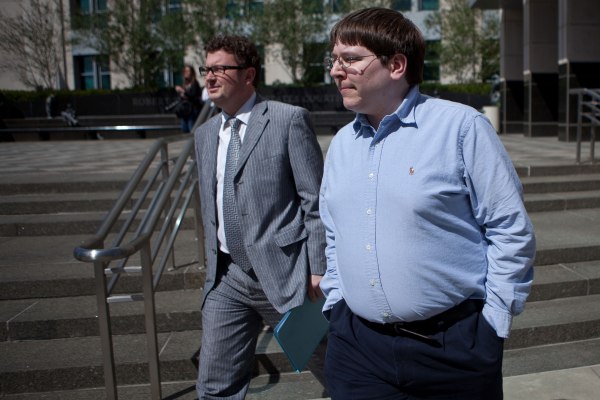Former Reuters journalist Matthew Keys was sentenced today to two years in prison on hacking charges. He faced a maximum sentence of 25 years. During his sentencing hearing, Keys tweeted, “This whole process has been exhausting.”
Keys was convicted last October of violating the Computer Fraud and Abuse Act (CFAA), in a bizarre case that led to the temporary defacement of a story about a tax bill on the LA Times website. (The headline was altered to read “Pressure builds in House to elect CHIPPY 1337” by an unidentified individual and was live on the Times‘ website for only about 40 minutes before it was corrected.)
Although Keys did not alter the headline himself, he was accused of sharing login credentials for Tribune Media, which owns the LA Times, in an Anonymous chatroom. Tribune Media claimed that the defacement resulted in the loss of $929,977.
Keys’ case drew widespread interest from technologists and activists because he faced charges under the controversial CFAA, legislation passed in 1986 that describes hacking in vague terms and can carry hefty prison sentences. The CFAA broadly defines computer crimes under terms like “unauthorized access” and “damage without authorization,” which give prosecutors discretion to interpret what “authorization” means in a given case. Efforts to reform the CFAA have been underway since noted activist and programmer Aaron Swartz was charged under the CFAA for downloading academic articles from JSTOR and committed suicide during his prosecution. However, these reform efforts have stalled in Congress.
Despite his conviction last October and the evidence against him, which includes chat logs, emails, and a confession, Keys has maintained his innocence.
“I am innocent, and I did not ask for this fight,” Keys wrote in a blog post published prior to his sentencing. “Nonetheless, I hope that our combined efforts help bring about positive change to rules and regulations that govern our online conduct.”
Keys’ attorney indicated that he would appeal the decision.
Update: Shortly after sentencing, Keys tweeted that he and his attorneys plan to file a motion to stay the sentence, pending appeal.
